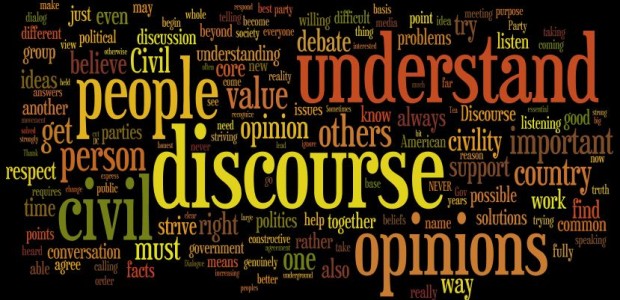

Are we losing civility? Over 1,000 US adults were surveyed in 2014 and a whopping 94% considered the tone and level of civility in the country to be a problem, with two thirds saying it was a “major” problem.
Government and politics were rated as less civil than any other public sphere–less civil than traffic or talk radio. Only places of worship and friends/relatives were thought to be places where people are civil.
What does civility mean? Generally, civility is defined as formal politeness and courtesy in behavior and speech. It is demonstrated by showing dignity, respect, and tolerance for others and their views. Civility does not mean we all agree. Civility means we disagree without being disagreeable. Civility is critical for sustaining the democratic principle that we are all entitled to hold and express our opinions. Civility ennobles our debates over common values and the common good.
“Civility means a great deal more than just being nice to one another. It is complex and encompasses learning how to connect successfully and live well with others, developing thoughtfulness, and fostering effective self-expression and communication.
Civility includes courtesy, politeness, mutual respect, fairness, good manners, as well as a matter of good health.”
– Pier Massimo Forni, professor and founder of the Civility Initiative at Johns Hopkins University
So who is responsible for improving civility? Survey respondents say the public, generally, bears the greatest responsibility for improving civility, followed closely by political leaders. The first step toward creating a culture of civility is what we do in our own lives.
A national conference of college Democrats, Republicans and Independent students came up with the ten recommendations for improving civil discourse.
“Ten Tips to Improve Civility”
1. Listen to opposing views.
2. Seek shared values.
3. Acknowledge the legitimacy of opposing positions.
4. Identify the problem at-hand, focusing on it rather than on larger conflicts.
5. Avoid political caricatures, labels and generalizations that may not truly represent the views of your adversaries.
6. Accept that disagreement will exist without giving up your own convictions.
7. Clarify what is being said before attacking and/or responding.
8. Recognize the value of solutions beyond those offered by traditional party platforms.
9. Consider the consequences of what you say and do.
10. Hold yourself personally accountable for your own political actions.
What can community leaders do to create a more civil environment? As political and governmental leaders we are charged with being exceedingly civil–we are in the public eye and our behavior sets an example for others. How we interact with each other influences how our public interacts with us.
Local government leaders set the tone and frame the debate. If local government is seen as uncivil, trust is diminished. If board members are uncivil toward each other, little progress can be made. If a governing board is uncivil toward professional staff, the staff will be fearful to share new ideas and opportunities. We owe it to each other and to our communities to treat one another with respect and dignity.
You model civility through your words and actions. As leaders, you can establish common expectations for behavior and adopt agreements and ground rules for civility in your local government. You can ask each other and the public to abide by these agreements. Civility begins with you. And if not you, then who?

